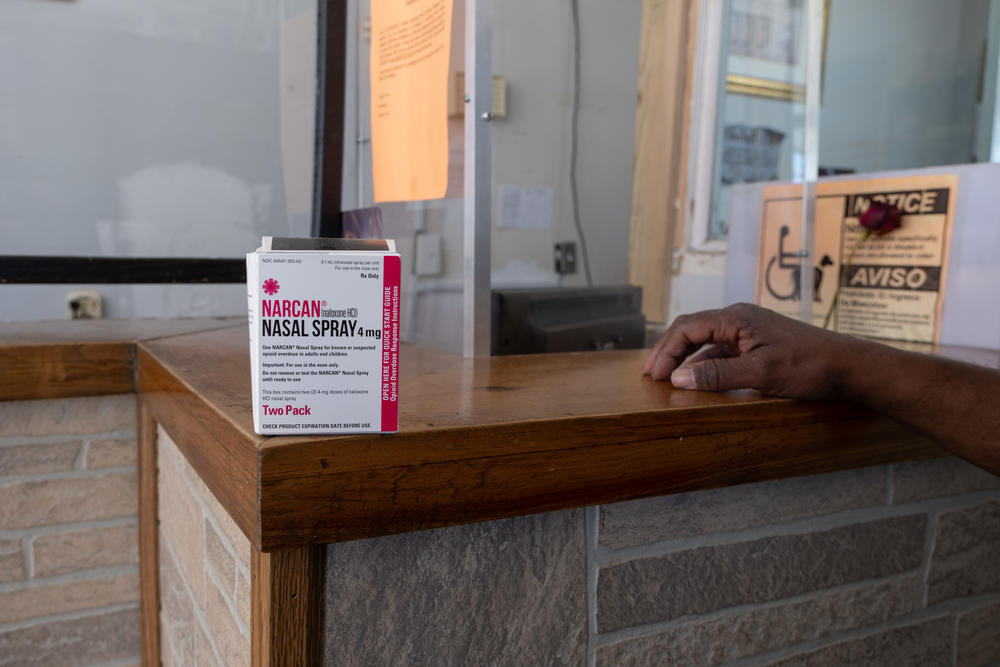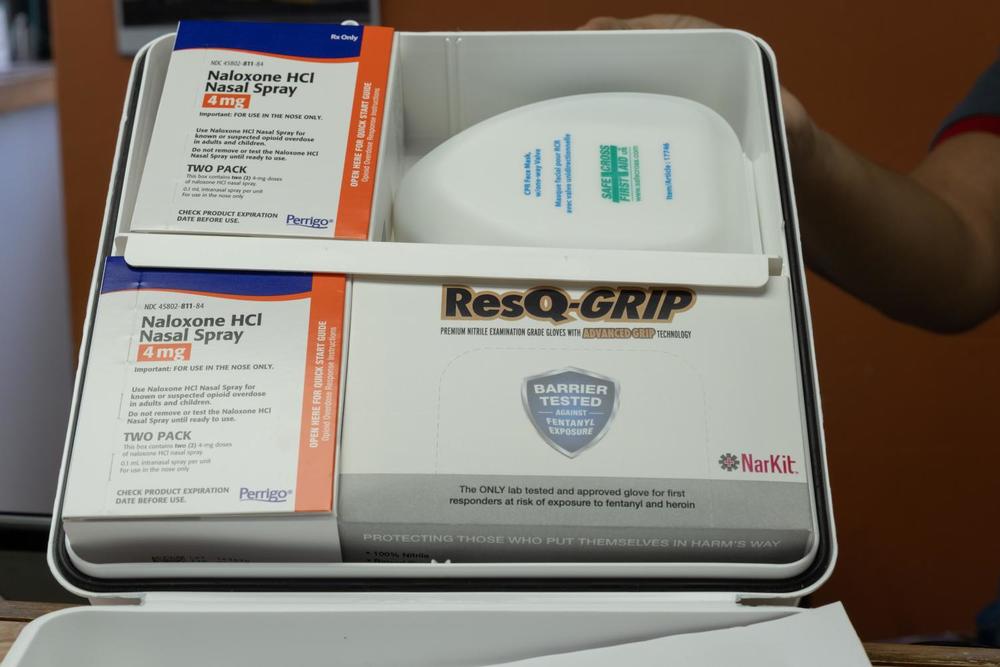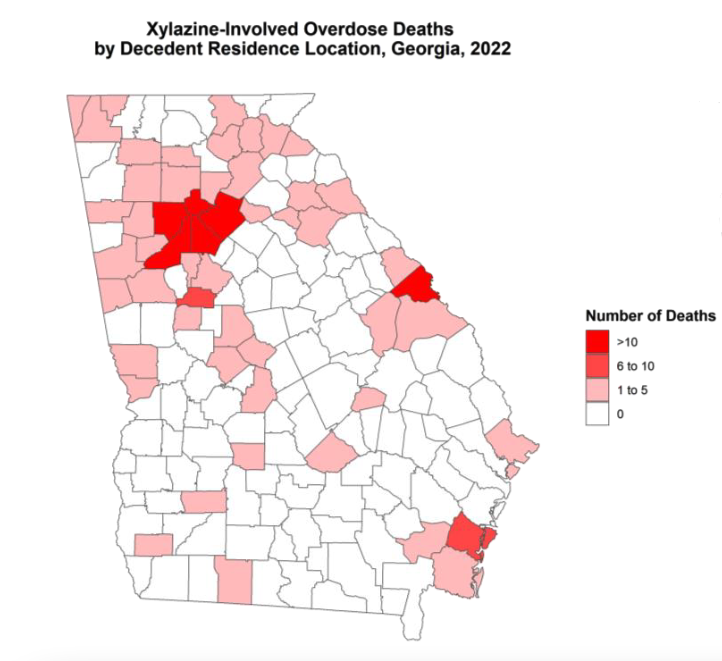
Caption
A two-pack box of Narcan nasal spray sits on the front desk of the Macon Inn in Macon, Ga. Narcan is one example of a resource counties could pay for using opioid settlement money.
Credit: Sofi Gratas / GPB News

A two-pack box of Narcan nasal spray sits on the front desk of the Macon Inn in Macon, Ga. Narcan is one example of a resource counties could pay for using opioid settlement money.
Shantzee Williams can rattle off motel room numbers from memory. Rooms where, over the past few years, her neighbors at the Macon Inn have died from drug overdoses.
“We seen more overdoses in these rooms than anything,” Williams said, sitting one recent afternoon outside a bottom-floor room. “It’s a lot of people. … People you’ve been done got attached to. We’ve just stayed around each other so long we’re like family, you know, just like a neighbor.”
Drug overdoses, fatal and nonfatal, have been on the rise nationwide for the past decade. But when COVID-19 began to spread across the globe in 2020, the number of overdoses skyrocketed. The worsening crisis is primarily driven by synthetic opioids such as fentanyl, according to the Centers for Disease Control.

A concierge at Motel 6 off Riverside Drive holds an overdose response kit that includes a CPR mask, Naloxone spray and instructions. The kit was supplied by the Department of Public Health after three people overdosed at the motel in December 2022.
The total number of opioid-related overdose deaths in Georgia increased by 101% from 853 in 2019 to 1,718 in 2021, according to data from the Georgia Department of Public Health. In Bibb County, such deaths jumped by 213% from 8 in 2019 to 25 in 2021, according to DPH data. Bibb County Coroner Leon Jones reported 19 fentanyl overdose deaths in 2021 and 24 last year, according to The Telegraph.
At the Macon Inn, on Riverside Drive near Spring Street, more than 375 emergency calls reporting a suspected drug overdose were made between December 2017 and May 2022, according to a lawsuit Bibb County filed against hotel owners in May 2022.
In November, a judge ordered the hotel to make safety improvements including fencing, security cameras and lighting. Management also is required to keep a minimum of 10 doses of Narcan available at the front desk along with posted instructions on how to use the live-saving nasal spray, according to the consent order.
The Macon Inn only had one box of two nasal sprays when reporters visited recently. A security guard on duty said the Macon-Bibb County Fire Department supplied the box months ago. A message left for the owner was not returned.
At Motel 6 off Riverside Drive, about five miles north of the Macon Inn, an overdose response kit is now kept at the front desk and a concierge said staff received trained on administering Narcan.
The kit wasn’t there Dec. 27, when Shannon Works and Ashley Banning Barnes died from apparent fatal overdoses in a third-floor room. A woman with them apparently overdosed too. She was unresponsive but still breathing when police arrived, according to a Bibb County sheriff deputy’s write up of the incident. First responders administered Narcan and revived her, the report said.
The deputy’s report noted a white, powdery substance on the nightstand and a small bag containing what looked to be crystal meth.
Marissa Cody, overdose surveillance and planning specialist for the Georgia Department of Public Health’s North Central Health District, said the three overdoses prompted the health department to supply Motel 6 with its overdose kit.
The kits are part of a statewide Naloxone access initiative to distribute overdose event kits and offer training in high-risk areas, Cody said. The kits contain four doses of Naloxone, disposable gloves and a CPR mask.
“I do believe since we had this really public overdose situation at the end of December, that our hotel owners have been like nothing more than open and welcoming to wanting to have something on hand to empower them to be able to act in these situations,” Cody said.
So far, kits in Macon have been distributed to two hotels, an addiction center, a street outreach organization and an agency that serves people experiencing homelessness. The health department declined to identify the specific recipients.
The health department also distributed Narcan to every Bibb County public school, two private schools, two colleges and three agencies serving people experiencing homelessness.
Another statewide DPH effort to prevent overdoses targets people regularly using illicit drugs.
Harm reduction methods aim to reduce the consequences of negative behavior and are a pillar of the U.S. Department of Health and Human Services’ Overdose Prevention Strategy. One example of this is a syringe exchange for intravenous drug users meant to reduce transmission of infectious diseases like HIV and hepatitis.
Cody said the North Central Health District has partnered with a behavioral health center and an addiction center to distribute fentanyl test strips to the folks they serve. The testing strips allow people to detect the deadly synthetic opioid in drugs before using them.
Cody said the partnering agencies report back monthly on how many testing strips have been disbursed. If someone notifies a partnering agency of a positive test for fentanyl, “we would love to hear that information … for us to kind of see what’s happening here in our illicit drug supply.”
The opioid crisis has evolved dramatically in the past decade as deadly synthetic opioids like fentanyl are increasingly reported in autopsies of overdose victims and in street drugs such as meth, crack cocaine and heroin.
In a recent public safety alert, the U.S. Drug Enforcement Administration said China remains the primary source of the precursor chemicals for fentanyl, which is then processed, manufactured and trafficked by the Sinaloa and Jalisco New Generation cartels in Mexico.

The Georgia Department of Health mapped Xylazine-related overdose deaths in 2022. One to five deaths each were reported in Middle Georgia counties including Bibb, Crawford, Monroe and Peach counties.
The U.S. Department of Health and Human Services declared the opioid crisis a national public health emergency in 2017. The same year, a cluster of drug overdoses in Macon confounded public health officials and made national headlines.
More than 20 people were hospitalized in Middle Georgia that summer after taking small yellow pills they bought on the streets and thought were Percocets. The pills contained two substances chemically similar to fentanyl that had never before been encountered by law enforcement in Georgia.
Last year, another new drug reportedly began circulating in Middle Georgia and was detected in drugs already tainted with fentanyl. The new drug, Xylazine, is an animal tranquilizer that can cause human body tissue to necrotize. Xylazine is not responsive to Narcan because it is not an opioid.
“Recreational drug use is not recreational drug use anymore,” Cody said. “I think it’s so important for people to be aware of what they are taking in. This used to not be, you know, even a situation … We have folks who are getting poisoned against their consent, they’re taking something against their consent.”
To contact Civic Journalism Fellow Laura Corley, call 478-301-5777 or email Corley_le@mercer.edu.
This story comes to GPB through a reporting partnership with Macon Newsroom.